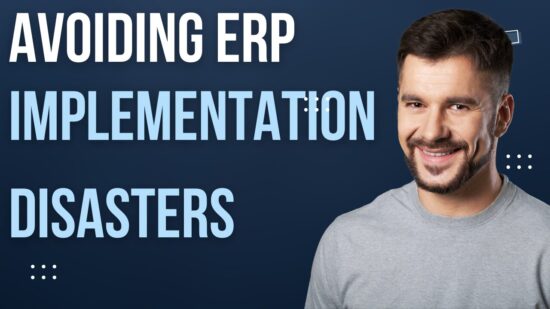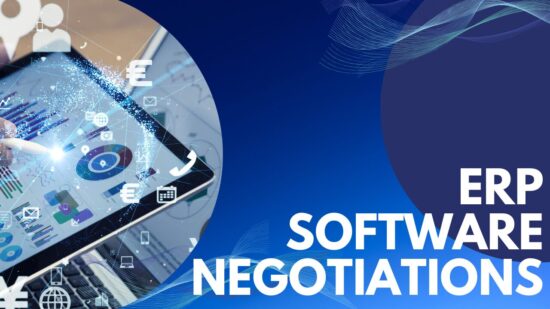Evaluating ERP Vendors: A Comprehensive Guide
Evaluating ERP vendors is crucial for implementing an enterprise resource planning (ERP) system. This process involves understanding the vendors’ capabilities, analyzing their market reputation, and comparing their costs, services, and support offerings. Selecting the right ERP vendor helps businesses optimize their operations and ensures a strong, long-term partnership that contributes to the company’s success.
In the ever-evolving world of technology, small and medium-sized enterprises can now benefit from rapid business analytics and comprehensive IT solutions. As more organizations prioritize converting data into valuable information, carefully assessing ERP vendors becomes essential in making informed decisions that impact the overall business strategy. By working with a reliable IT consultant, businesses can navigate the complexities of choosing an ERP vendor, ensuring they make a choice that aligns with their objectives and requirements.
Key Takeaways
- Evaluating ERP vendors is critical in optimizing business operations and facilitating long-term partnerships.
- A comprehensive assessment of capabilities, market reputation, and costs ensures an informed vendor selection process.
- Working with a trusted IT consultant can help businesses navigate the complexities of ERP vendor assessment.
Download the BACS Consulting Group ERP Vendor Selection Checklist
Understanding ERP Vendors
When successfully implementing an Enterprise Resource Planning (ERP) system, selecting the right vendor is critical. In this section, we’ll discuss defining ERP vendors and provide guidance on understanding and evaluating them effectively.
Defining ERP Vendors
ERP vendors develop, sell, and support ERP software solutions. These solutions streamline and integrate all aspects of a company’s operations, including finance, manufacturing, supply chain, procurement, and human resources. With a wide range of ERP vendors available, it’s essential to understand what they offer and how their solutions can fit your business needs.
As you move forward with your ERP evaluation process, familiarize yourself with the different functionalities vendors provide and consider how they align with your company’s requirements. Some key factors to consider when evaluating ERP vendors:
- Functionality: Ensure the ERP system covers all essential business processes and meets your organization’s needs.
- Ease of use: Look for a user-friendly interface and assess the learning curve associated with the software.
- Scalability: Evaluate the potential growth of your company and choose a solution that can scale with your needs.
- Integration capabilities: Check if the ERP system can easily integrate with your existing software applications and systems.
- Total cost of ownership: Analyze the total cost, including implementation, licensing, support, and maintenance, to make an informed decision.
- Vendor credibility and support: Research and assess the vendor’s reputation, customer reviews, and quality of customer support services.
By carefully evaluating and understanding ERP vendors, you’ll be better equipped to make the right choice for your company’s unique needs. Remember that selecting the ideal vendor is crucial for a successful ERP implementation and, ultimately, the growth and efficiency of your organization.
Assessing ERP Vendors’ Capabilities
When evaluating ERP vendors, it’s essential to thoroughly analyze their capabilities to ensure that the selected solution aligns with your organization’s requirements. This section will focus on two primary aspects: technical capability and business goal alignment.
Technical Capability
Examining a vendor’s technical capabilities ensures that the ERP system will effectively cater to your organization’s needs. Consider the following factors:
- Scalability: Verify that the ERP system can grow with your business without significantly increasing costs or requiring major structural changes.
- Integration: Assess whether the system supports integration with other solutions and tools your organization relies on, such as CRM, HRMS, or e-commerce platforms.
- Customization: Determine if the ERP system allows customization to meet unique business requirements and gauge the complexity involved in such modifications.
- Data Security and Compliance: Evaluate the vendor’s data security practices and check if they comply with relevant industry standards and regulations.
Business Goals Alignment
The selected ERP system must align with your organization’s objectives and requirements. To ensure the system can help you achieve your targets, focus on the following aspects:
- Core Functionalities: Identify the essential modules and features the ERP system offers, such as financial management, supply chain, and human resources, and check whether they address your business needs.
- Industry Expertise: Determine if the vendor possesses experience in and knowledge of your industry, which can help implement solutions tailored to your organization’s unique challenges.
- Training & Support: Evaluate the quality and availability of the vendor’s training resources and support services, as they are crucial to the successful implementation and usage of the ERP solution within your organization.
By carefully assessing these factors, you can make a well-informed decision in selecting an ERP vendor capable of supporting your organization’s needs and growth.
ERP Vendors’ Market Reputation
In evaluating ERP vendors, it’s essential to consider their market reputation. This section will dive into customer reviews and market share to help you better understand these critical factors.
Customer Reviews
When assessing an ERP vendor, customer reviews play a crucial role. You want to look for testimonials, case studies, and reviews from businesses implementing the ERP system. Keep an eye on:
- User satisfaction: Are customers generally happy with the system and its features?
- Ease of use: How intuitive and user-friendly is the system, according to users?
- Implementation experience: Was the software adopted smoothly, or did clients encounter issues during the process?
- Support quality: How is the quality of customer service, including response times, problem-solving, and overall assistance?
To streamline your research, you can check websites like G2, Capterra, and Software Advice, which provide comprehensive, unbiased ERP system reviews.
Market Share
Another critical factor to consider when evaluating ERP vendors is their market share. It can provide insights into a popular and widely adopted system.
- Leading vendors: List key players in the market, often indicating long-standing expertise and reliable solutions.
- Industry-specific solutions: Pay attention to the vendors’ specialization within your industry as it will often result in a more tailored and suitable ERP system for your business.
- Size-specific solutions: Check if the vendors cater to businesses similar to yours since the needs of small, midsize, and large enterprises can differ significantly.
These factors will give you a thorough understanding of the ERP vendors’ market reputation and help you make a confident decision for your business.
Costs of ERP Vendors
When evaluating ERP vendors, it’s important to consider the costs associated with acquiring and implementing an ERP system. These costs can be broken down into two main categories: Upfront and Ongoing.
Upfront Costs
Upfront costs are the initial expenses to purchase and implement an ERP system. Some common examples include:
- Software Licensing: You must pay for the ERP software license, which may vary depending on the number of users, modules, or features you want to include.
- Hardware and Infrastructure: Depending on the deployment method (on-premise, cloud, or hybrid), you may need to invest in servers, storage, networking, and other hardware or infrastructure.
- Implementation Services: Implementing an ERP system often requires the assistance of consultants, integrators, or internal IT resources to set up and configure the system.
- Data Migration: Migrating your existing data to the new ERP system can be time-consuming and may require additional tools or services to ensure a smooth transition.
- Training: Your employees will need training on using the new ERP system, which can be provided in-house or by external trainers.
Ongoing Costs
Aside from the initial investment, ongoing costs are associated with operating and maintaining an ERP system. Some common examples include:
- Software Updates and Maintenance: Regular software updates are often required to keep the system up-to-date and secure. This may include fees for maintenance agreements, bug fixes, and new feature releases.
- Support Services: Technical support may be required to troubleshoot issues and ensure the system’s smooth operation. Support costs can depend on the level of service you require (e.g., 24/7 support, onsite support, or remote support).
- Cloud Hosting Fees: If you choose a cloud-based ERP solution, you will likely need to pay ongoing hosting fees based on your usage, storage, and bandwidth requirements.
- Customization and Integration: You may need additional customizations or integrations with other systems over time. These costs can vary depending on the complexity of the customizations and the skills required to implement them.
- License Renewals: Depending on the terms of your software license, you may need to renew it periodically, which can result in additional costs.
Understanding and comparing the costs associated with various ERP vendors is crucial for making an informed decision. By considering both upfront and ongoing costs, you can better estimate your total cost of ownership and select an ERP system that fits your budget and needs.
Vendor Support and Services
When evaluating ERP vendors, paying close attention to their support and services is crucial. This section will discuss the importance of Implementation Support and After-Sales Service, essential for a successful ERP implementation and long-term partnership with the vendor.
Implementation Support
A well-structured and organized implementation support is critical for a smooth ERP rollout. Consider the following dimensions when evaluating a vendor’s implementation support:
- Methodology: Ensure the vendor follows a proven and efficient implementation methodology that aligns with your business requirements.
- Project Management: Look for strong project management capabilities, including communication, planning, tracking, and reporting.
- Technical Expertise: Verify that the vendor has experienced technical resources to address potential complexities and challenges during implementation.
- Training: Evaluate the vendor’s training provisions to ensure your team can effectively use the ERP system upon deployment.
After-Sales Service
Once your ERP system is up and running, securing reliable after-sales service from the vendor is vital. Assess the following aspects to gauge the quality of their after-sales service:
- Service Level Agreements (SLAs): Review SLAs to ensure they meet your business needs and outline the expected response times and support levels.
- Helpdesk and Support Channels: Check for accessible helpdesk services and multiple support channels, such as phone, email, and chat.
- Software Updates & Maintenance: Inquire about the vendor’s policies for software updates and maintenance, including frequency, cost, and ease of implementation.
- Customer Success Management: Investigate if the vendor has a dedicated customer success manager assigned to nurture your long-term success and address any questions or concerns.
Evaluate ERP vendors based on their implementation support and after-sales service offerings to establish a strong, collaborative partnership that lasts well into the future.
Comparing Different ERP Vendors
When evaluating ERP vendors, it’s crucial to have a systematic approach to ensure you’re making the best choice for your organization. This section will discuss a Vendor Comparison Framework to help you compare and contrast different ERP vendors and make an informed decision.
Vendor Comparison Framework
- Identify your requirements: Before comparing vendors, you must clearly understand your organization’s needs and priorities. Outline your business processes, goals, and expected benefits from the ERP implementation. This will serve as your checklist when evaluating vendors.
- Develop a list of potential vendors: Research the ERP market and identify the top vendors that offer solutions tailored to your industry and company size. You can use resources like analyst reports, customer reviews, and industry blogs to create a shortlist of vendors.
- Create an evaluation matrix: Use a comparison matrix to rate how well each vendor meets your criteria. Some examples of criteria include:
- Functional fit: Does the ERP system support all your required business processes?
- Scalability: Can the ERP solution grow with your organization?
- Technology stack: Is the vendor’s technology compatible with your IT infrastructure?
- Implementation timeline: How long will it take to implement the solution?
- Cost: Does the pricing structure align with your budget?
Rate each vendor on a scale from 1-5 on these criteria, with 5 being the highest.
- Request demonstrations and proposals: Schedule demos with the top vendors on your list to see their solutions. After the demos, ask each vendor for a detailed proposal outlining the ERP project’s scope, timeline, cost, and deliverables.
- Analyze results and decide: Use the information gathered in the comparison matrix and from the demos and proposals to select the ERP vendor that best meets your needs and requirements. Consider factors such as overall scores, pricing, and implementation team experience.
By following this vendor comparison framework, you should be able to confidently evaluate different ERP vendors and identify the one that will best serve your organization’s needs.
Finalizing The Vendor Selection
Decision Making
When finalizing your decision on an ERP vendor, evaluating all the relevant criteria is crucial. Start by reviewing the features and functionalities of their ERP systems. Ensure that the system aligns with your business processes and overall goals. You can consider the following aspects:
- Features and Functionality: Evaluate how well the ERP system meets your business’s needs, including user experience, integration capabilities, and scalability.
- Cost: Determine the total cost of ownership (TCO), including licensing fees, implementation costs, and ongoing support expenses.
- Deployment Model: Assess if the vendor provides a suitable deployment model for your organization, such as on-premises, cloud-based, or hybrid.
- Vendor Reputation: Research the vendor’s market presence, track record, and customer satisfaction to establish credibility in the ERP industry.
To organize and simplify the decision-making process, consider creating a weighted scorecard that ranks each vendor’s offering based on the following factors:
| Criteria | Weightage | Vendor A Score | Vendor B Score | Vendor C Score |
|---|---|---|---|---|
| Features | 30% | |||
| Cost | 25% | |||
| Deployment Model | 20% | |||
| Vendor Reputation | 15% | |||
| Support & Maintenance | 10% |
Note: Adjust the weightage and scoring as per your organization’s priorities.
Once you have scored each vendor, compare the results to identify the best fit for your organization. Remember, choosing the right ERP vendor is a significant decision that will impact your business for years to come, so take the time to thoroughly analyze each option before finalizing your selection.
Why Work With BACS Consulting Group For All Your ERP Administration
BACS Consulting Group is the ideal partner for all your ERP administration needs, as they offer comprehensive information technology solutions for various business sizes, from startups to well-established corporations. Working with BACS Consulting Group will ensure you receive expert guidance and exceptional quality in handling your ERP systems.
Over the past three decades, the focus in IT has shifted from data management technology to information management technology. BACS Consulting Group understands this shift and keeps up with it, ensuring that your business processes are up-to-date and efficient. By converting data into actionable information and knowledge, your organization can make better decisions and stay competitive in today’s market.
The world is experiencing a revolution in business as rapid business analytics become more affordable and accessible to small and medium-sized enterprises. BACS Consulting Group acknowledges the importance of these technological advancements and is dedicated to bringing the benefits of this revolution to your business through ERP administration services.
By partnering with BACS Consulting Group, you receive personalized attention and focus on the small details that can significantly impact your business processes. The long-lasting relationships they build with their clients testify to the trust, satisfaction, and mutual success they bring to each partnership.
Working with BACS Consulting Group for your ERP administration needs ensures you receive comprehensive IT solutions, stay ahead of technological advancements, and improve your business processes to make better-informed decisions. Their dedication to quality and tailored approach sets them apart as a reliable partner in managing your ERP systems.







